Prediction on Ireland’s 8th Amendment it’ll be a narrow(ish) win for Yes but what’s certain is that politics has been altered.
The campaign leading up to the referendum in which the Irish people will be asked whether they wish to repeal or retain the 8th Amendment to the Constitution on the eternally vexed issue of abortion has reached its conclusion and all that’s left is for voters to go to their polling places and mark Yes or No. Anecdotally, anyway, both political insiders and casual onlookers are saying it is not a moment too soon and desperately want to let the electorate deliver its verdict and move on.
As they have from day one, the latest opinion surveys give the Yes side a clear advantage. It is manifest that the majority wishes to liberalize the abortion regime here and accept that the only way they can allow for the termination of pregnancy in “hard cases” – rape, incest and fatal fetal abnormality – is to consign the 8th Amendment to history.

A poster seen across Ireland from the "Save the Eighth" pro-life campaign.
Indeed, advocates for Yes have done a sterling job in focusing the discussion on the awful scenarios that have unfolded and will continue to unfold without legal change. There is no question that, particularly in the instance of a diagnosis of a severely life limiting condition, some Irish women and their families have been traumatised unjustifiably. While these typically constitute a tiny percentage of the overall number of abortions in other jurisdictions, they are compelling and require action.
Read more: Ireland told this Irish American woman she had to carry her dying fetus to term
What has complicated matters, however, is the legislation that is in the offing if the referendum is passed. Pursuant to the government’s proposal, abortion will be accessible without restriction as to reason for the first 12 weeks of pregnancy. Many on both sides are profoundly uncomfortable with this.
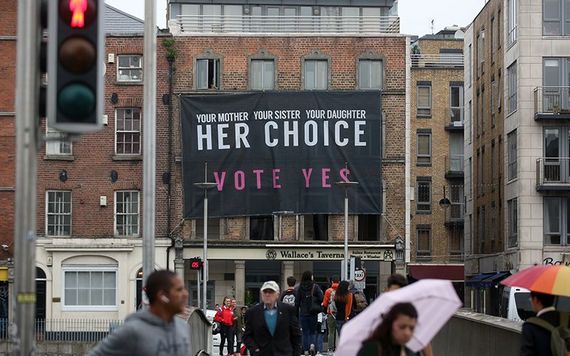
A Yes vote banner hung along the River Liffey, in Dublin.
And herein lies a politically persuasive closing argument for the No side: regardless of your view of the 8th Amendment, what has been mooted is too extreme. This is targeted directly at the not insignificant cohort of men and women who have defined themselves as Yes supporters, but simultaneously voice serious reservations about legislation that undeniably represents a giant leap from the present position of the unborn under the law.
Implicit in this argument, which is now being espoused by No spokespersons and is shaped inexorably by the realities of political arithmetic, is that the 8th Amendment isn’t perfect and mightn’t be entirely fit for purpose anymore, but the government can put forward something better than what is currently on the table. The difficulty with taking this stance is that the stalwarts of the Irish pro-life movement have opposed any liberalization of abortion laws in the past, even in “hard cases.”
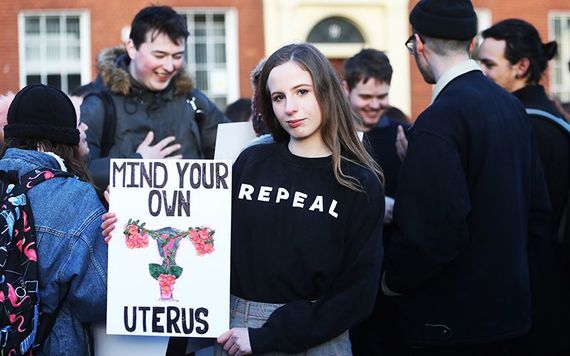
A repeal the eighth protester making her message clear.
This was apparent in the final televised RTÉ (Ireland’s national broadcaster) debate on Tuesday. Peadar Tóibín, a progressive Sinn Féin TD (member of Irish parliament) who has bucked his party leadership and is passionately urging a No vote, was reminded by his counterpart, Minister for Health Simon Harris, of his long-standing opposition to abortion in cases of rape and incest. Tóibín’s is the intellectually consistent position – if one believes that all unborn life is sacred, then the circumstances of conception are immaterial – but it is out of step with what most of the electorate thinks.
Please vote yes tomorrow for compassion and care #TogetherForYes pic.twitter.com/5XyAM79ejl
— Simon Harris TD (@SimonHarrisTD) May 24, 2018
In truth, the Irish people, broadly speaking, recognize that abortion is a complex issue. Polling strongly suggests that they don’t see black and white, but several shades of grey. This was evident from my own experience in Wicklow Town on the weekend before the referendum where Yes and No campaigners set up stalls on the main street. I watched them for some time and witnessed nothing but positive and constructive engagement with passers-by.
It was also evident in the last of an excellent series of pieces on RTÉ’s Morning Ireland radio program in which reporter Cian McCormack has been talking to “ordinary citizens” about their voting intentions on the referendum. He met with two women in the County Galway town of Portumna, who identified as “great friends” and, after outlining their fundamentally different views about the 8th Amendment, affirmed that they would remain “great friends” afterward.
This contrasts totally with the harsher rhetoric and personal attacks that have been inescapable on Irish Twitter. Strident activists on both sides have written some terrible things about people who happen to see things another way. And sadly, there has been little tolerance for those with nuanced perspectives during this campaign. One can only hope that what has been said in the heat of the moment can be forgiven and forgotten in time.
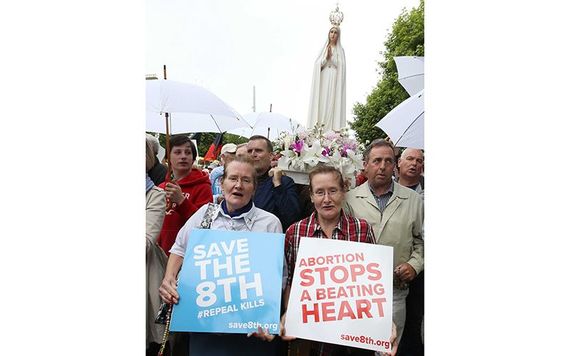
A Save the Eight pro-life rally in Dublin.
As for the outcome, nearly all of the insiders are calling a narrow(ish) win for the Yes side. I concur. But my forecast – and many of their own – is accompanied by a health warning, given the unpredictability that inheres in Irish referendums and that is a prominent feature of politics throughout the western world as of late.
Moreover, there is a suspicion of a hidden No vote, especially among some who are hoping against hope for a Yes and won’t believe that they have achieved victory until it is official. Some observers (this one included) opined that this might be a factor in the latter days of the marriage equality referendum campaign in 2015. We were largely incorrect. We will soon know if precedent is any dictate on these two both similar and dissimilar topics.
By way of further prediction, no matter what the result, the dynamics of Irish politics have been altered by recent events in one crucial sense. The conventional wisdom has always been that abortion, while it can inflame emotions and expose divisions like nothing else, is virtually irrelevant when TDs seek election or re-election. History bears this out. No more. Abortion will be an issue in general elections from here on.
* Larry Donnelly is a Boston attorney, a Law Lecturer at NUI Galway and a regular media contributor on politics, law and current affairs in Ireland and the US.
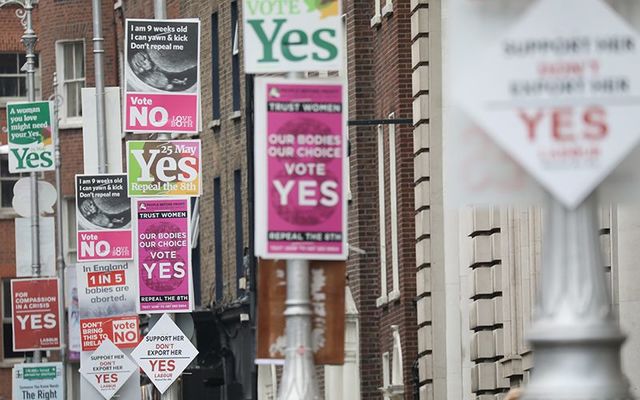
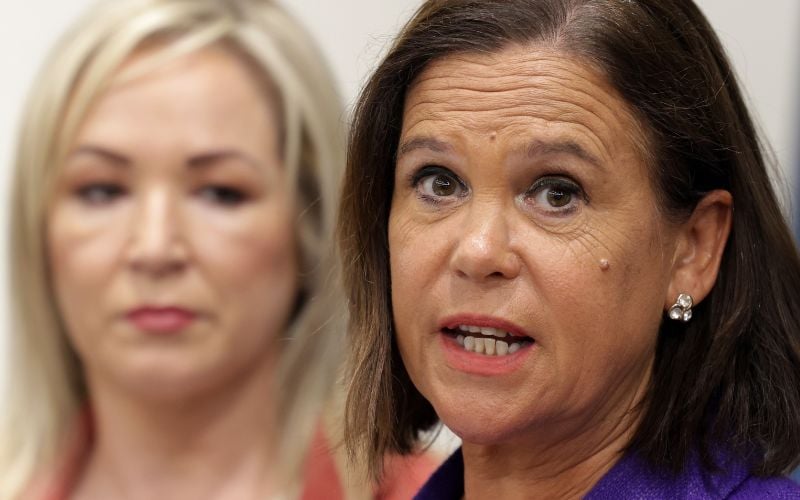


Comments